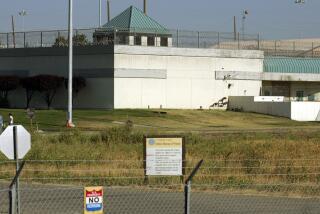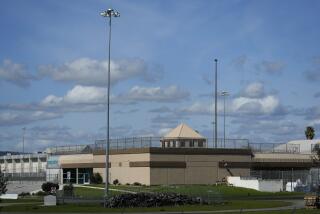Op-Ed: How men at New Folsom Prison reckon with toxic masculinity
There have been an overwhelming number of news stories of late focused on the behavior of men, from boorish and crass to criminal. Not coincidentally, the wave of sexual-harassment and assault charges has crested a year after we elected president an individual who, in his own words, takes pleasure in grabbing women without their permission. Together the accounts are validating long-held assumptions about the real cost of doing business in a male-dominated society.
I have contributed to this problem, and I have also searched for a remedy. For 24 years, I was a resident of various prisons run by the California Department of Corrections and Rehabilitation, most recently New Folsom Prison. I was serving a life sentence for a laundry list of offenses, committed as part of my once-chosen vocation of gangster.
As a gang member, I immersed myself into a world of toxic masculinity. I saw victimizing others as not merely a choice but a right. If I wanted something, I took it. If someone was in my way, I knocked them down.
It is easy for me to identify with the mindset of the men who are being unmasked in this ongoing flood of stories, even though they have led their lives in a very different kind of context. I see the air of entitlement that comes from having power over others, the rush and euphoria of invincibility.
I don’t know if men’s group work is a model that can bring healing to everyone, but I do know that it works for some of the most damaged of men.
I embraced this way of being at a young age. I joined a gang when I was 14 years old, and at each phase of the descent into that lifestyle, I was instructed by other “hypermasculine” males on how to spew my specific brand of poison into the world.
While sitting in solitary confinement — not for the first time — for stabbing another prisoner nearly 30 times, I began to wonder how I had spiraled so far into the abyss. I didn’t have answers to the questions that began to crop up in my mind, but I knew that the questioning was due.
This inquiry led me to “doing my work.”
“Doing work” is vernacular I learned at New Folsom Prison. When I was released from solitary, I was invited to join a men’s group called the Inside Circle. Unsure what to expect from sitting around a candle with a bunch of dudes, I halfheartedly agreed to give it a try, knowing that I could walk away at anytime.
I quickly realized that I had entered a realm that would change my life. Sitting “in circle,” each man in the room takes a turn delving into his darkest emotions — or resisting doing so. In the process, each man is challenged, confronted and supported by other men.
The Inside Circle is made up of men who have been confined to a maximum-security prison, often for decades. They are men who learned early on to meet feelings of vulnerability with violence and force. It is not unusual for confrontations in circle to become physical in some respect. But together these men manage to redefine vulnerability as a sign of strength rather than weakness.
The circle allows men to examine the most vile and horrendous deeds a human can perpetrate on another — without condemnation, judgment or justification. Instead, they are permitted to be curious so that they might locate the origins of their frame of mind.
In circle, I got to see others struggle through the truth of their actions and support them through the process. I also got the benefit of men supporting me as I investigated my dark corners and figured out where I am damaged as a human being. The work took me back to my early childhood, when I began to bury pain that I then crafted into a justification for hurting others — a way to disguise my fear, insecurity and shame. The circle graced me with awareness of the damage I am responsible for, and with it came something entirely new: accountability.
The circle takes it to the next level, challenging men to change what does not work. Harming others does not work. Harming oneself does not work. Manipulation does not work. Control and dominance do not work.
I have often wondered if and how we as a society can put an end to our legacy of aggression and violence, in which men use their position to prey on others. The trickle-down effect is so pernicious that sometimes women even blame women.
Our collective groupthink reminds me a lot of the prison mentality — people just going along with something we all recognize is wrong so as not to stand out. I don’t know if men’s group work is a model that can bring healing to everyone, but I do know that it works for some of the most damaged of men.
I have witnessed transformation in the deepest, darkest bowels of society, among people deemed the most despicable of humanity. If change can occur under those circumstances, isn’t it possible outside?
Eldra Jackson III served 24 years in the California prison system, was released in 2014 and now works in the traffic-control business. He appears in a new documentary about group therapy in New Folsom Prison, “The Work.”
Follow the Opinion section on Twitter @latimesopinion or Facebook
More to Read
A cure for the common opinion
Get thought-provoking perspectives with our weekly newsletter.
You may occasionally receive promotional content from the Los Angeles Times.





